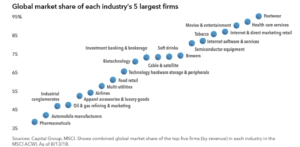
Consolidation in footwear speaks volumes about their high prices.
The Democratic presidential primary pitted an anti-capitalism leader against a set of moderate contenders, with Elizabeth Warren straddling both by arguing about breaking up too-big-for-our-good companies to encourage more capitalistic competition. Who is right?
There are three main mechanisms by which companies get really big: (1) by capturing economies of scale that give bigger sized companies an inherent advantage; (2) by developing or acquiring non-competing, synergistic products that accelerate growth; and (3) by acquiring direct competitors to gain control in a market and reduce supply. Facebook and Google are examples of #1. An example of #2 is Intuit acquiring Turbo Tax to extend its line of personal finance tools. The airline mergers are a classic example of #3, which in this case led to industry consolidation.
It’s within that third strategy—acquiring the competition—that you can easily find fodder to both defend and criticize capitalism.
Here’s an example to defend. Morgan Stanley offers to buy E-Trade at a premium, hoping to cut costs and grow revenues more than if the companies remained independent. The move makes strategic sense for both sides.
E-Trade allows consumers to buy and sell stocks quickly and cheaply. Its business has been threatened by competitor Schwab who acquired E-Trade’s competitor, TD-Ameritrade, and then made trading of stocks free to those holding funds at Schwab. Weakened, E-Trade’s board will welcome becoming part of something stronger.
For Morgan Stanley, the acquisition creates a more robust wealth management business for a company that wants to be less dependent on its Wall Street investment management roots and deal-driven fees. If the acquisition goes through, Morgan Stanley will now have both advisory-driven wealth management services and a direct-to-consumer model, two essential channels. By adding less-wealthy clients (today but not necessarily in the future) to its wealth management practice, it opens the door to selling new products to both. This is how capitalism works to benefit both companies and consumers.
In contrast, mergers/acquisitions that are driven primarily to cut costs and gain market power, with no benefit to customers, have a very different impact on the economy. The Exxon-Mobil merger in 1988, along with BP’s acquisition of Amoco in the same year, fell into that category. The coming together of Heinz and Kraft was more of the same. Here, cost synergies far outweigh any revenue synergies or additional customer value. The past three decades have been rife with this type of consolidation.
There are three problems with acquisitions that are primarily cost-cutting driven, competition limiting. First, nothing has changed in the growth engine, but now the company must grow at the same or greater rate from a much higher base, requiring a lot more additional revenue. The Kraft Heinz Company is a prime example of this problem. It responded to the growth challenges with further cost-cutting. Yes, profits grew, but, it essentially eliminated innovation and brand building. As a result, revenue and market share fell. Only now is the company talking about beefed up advertising. How much can this move help if innovation gaps remain?
Second, the larger company can create barriers to entry for the competition. think Facebook. This concern is Elizabeth Warren’s major concern. In biotech tools, Thermo Fischer is the consolidator. The good news is the culture is not highly innovative so innovation happens around it. The bad news is new innovative companies end up purchased by Thermo, as they cannot easily scale. We can debate the net result.
The third problem is Crony Capitalism. “Crony capitalism is an economic system in which businesses thrive not as a result of risk, but rather as a return on money amassed through a nexus between a business class and the political class,” according to Wikipedia. Larger companies have larger lobbying budgets aimed at creating advantage through laws and regulations. Wonder why Medicare does not negotiate with the drug companies to reduce prices in contrast to most other nations? Crony Capitalism. Bernie Sanders and Elizabeth Warren rail against this behavior of corporations.
In theory, we should be protected against Crony Capitalism and other forms of wrong-for-the-market mergers and acquisitions by the Antitrust Division of the Department of Justice, in conjunction with the Federal Trade Commission (FTC). These agencies should be refusing “too big” deals that require their approval to move forward. Europe has a similar, but far more effective structure. One could argue US agencies are not doing their job as evidenced by the fact that industries are becoming more consolidated and market entry is getting harder, from on-line retail (with Amazon as the giant) to technology (with Google and Facebook as the giants).
So, are companies really “too big”? Is there too much consolidation? Maybe yes … in some cases. Data from the Capital Group (See Chart) supports the argument that some companies are “too big” in the sense of hoarding market share and thus diminishing competition. As you can see in the chart, the top 5 companies in many sectors control more than 50% of the market share for their industry. Are the running shoes made in Asia really worth $125 plus?
But this data is no reason to make blanket statements about whether capitalism is good or bad. Capitalism can generate a ton of innovation, income and wealth, but it can also lead to unacceptable income inequality and crony capitalism. Which outcomes we see primarily depends on the strength of our democracy.
Let’s hope the Presidential primary and election debates dig deeper into why corporations have so much power, when that is positive and negative, and how we can do better at developing and enforcing anti-trust policies in this new decade.

Leave a Reply